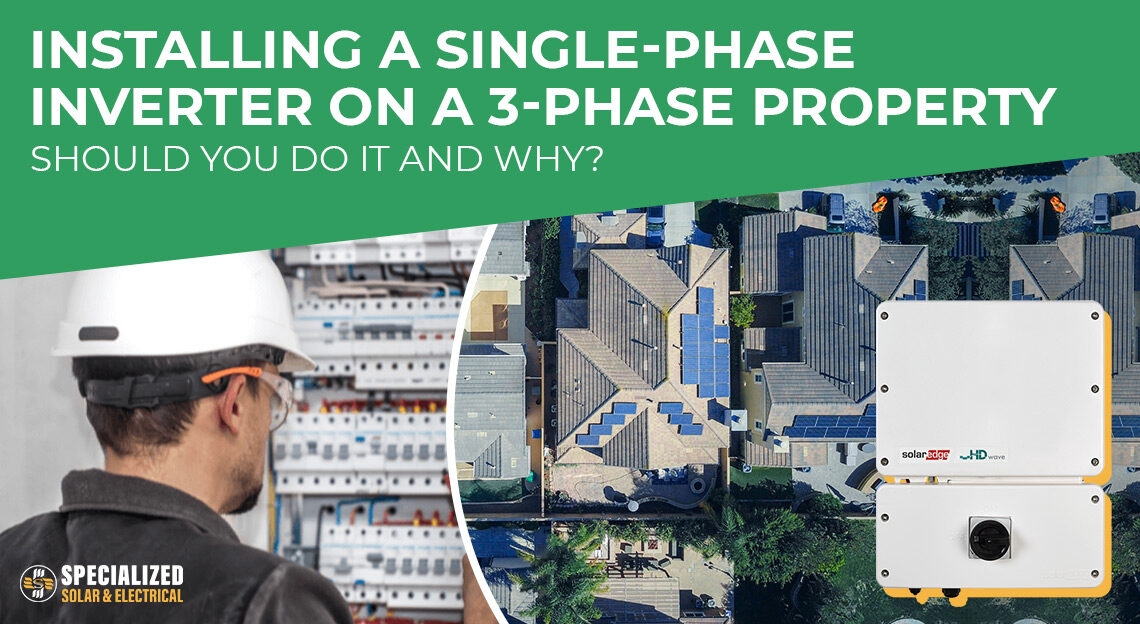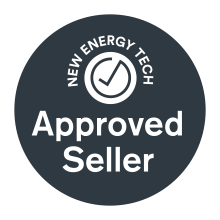If you live in a property with a three-phase power connection, it’s logical to assume that you will need a three-phase solar inverter if you install solar panels.
Right?
Well, no… it’s wrong.
You can install a single-phase solar inverter on a three-phase property. And – in many cases – a single-phase inverter will be the best solution.
You can of course install a three-phase solar inverter. But it will be more expensive and may be unnecessary.
With a single-phase solar inverter, you get credited for the full value of your solar generation across all three phases.
The reason why this works is because of net metering.
On this blog:
- What is net metering?
- How can I get the full value of my solar across all three phases if I only have a single-phase inverter?
- What’s the main requirement for net metering to work?
- When is a single-phase inverter best for a 3-phase home?
- A word on battery back-up
What is net metering?
A net meter is a smart meter with built-in net metering software. Most modern smart meters include net metering.
The net meter calculates the difference between your grid exports and grid imports for a set period (typically 30 minutes).
Your electricity retailer uses the data from the net meter to work out how much to charge you for electricity for the set period.
What the net meter tells your electricity retailer is:
- How much electricity you exported to the grid for the set period (e.g. 6kWh)
- How much electricity you imported from the grid for the set period (e.g. 3kWh)
The net result is how much you are charged (or credited) by your retailer for that period.
In the above example, you would be credited for 3kWh as you exported more to the grid than you imported.
How can I get the full value of my solar across all three phases if I only have a single-phase inverter?
It is true that a single-phase solar inverter will only send electricity to one of your home’s three phases. But from your viewpoint, that doesn’t matter.
Because of net metering, you get the full value of your solar generation across all three phases. This is regardless of whether you have a single-phase inverter or a three-phase inverter.
For example, over a 30 minute period your solar panels generate 3kWh of electricity. Each phase of your home requires 1kWh of electricity during this period. The single-phase inverter supplies 1kWh of solar electricity to your home and exports the remaining 2kWh to the grid. Meanwhile you need to draw 2kWh of electricity from the grid to meet the power requirements of the two other phases of your property.
What net metering does is take the total exports for this period (2kWh) and deducts the total imports for the period (2kWh). The net result is that you aren’t charged anything for electricity for this period.
That means that the full value of the solar electricity you generated is accounted for by your electricity retailer.
By installing a three-phase solar inverter, you would get exactly the same result.
What’s the main requirement for net metering to work?
You only get the benefits of net metering if you are allowed to export your surplus solar electricity to the grid. If you can’t export your surplus solar electricity, you can’t offset your grid imports. That means you won’t get the full value of your solar generation across all three phases.
When is a single-phase inverter best?
A single-phase inverter can be right choice for a three-phase property in the following circumstances:
- Your home uses up to 20 kWh of electricity a day
- Your solar panel system is up to 10kW in size
- You are allowed to export at least 3kW (ideally 5kW) of your solar electricity to the grid
- If you are planning on getting a battery, backing up on just one phase in the event of a blackout will be sufficient for your home
When a three-phase inverter is better:
- If your home uses more than 20kWh of electricity a day
- If you are allowed to export at least 5kW per phase
- If you require battery back-up across all three phases
A word on battery back-up
It’s worth mentioning that homes are rarely balanced across all three phases. Generally, the first phase is the main phase that most of your electrical appliances run off. More commonly, just a few items in your home are connected to the other phases such as a spa or air conditioning.
If you intend to purchase a battery for your three phase property, it’s important to know that a single-phase inverter will not be able to back-up all three phases in the case of a power outage.
Even if you purchase a three-phase battery and run it alongside a single-phase inverter, it will only back-up one phase. And when the battery runs out of charge, you won’t be able to power it from your solar panels during the outage.
However, if you purchase a single-phase battery and run it with a single-phase inverter you will be able to continuously charge the battery from the solar panels during a black-out. But of course, it will only provide power to one phase. This may well be sufficient if most of your electrical items are on one phase.
If you need all three-phases to work during a black-out, you will need a three-phase inverter as well as a three-phase battery. However, the costs of this set-up will be several thousand dollars more than a single-phase inverter and a single-phase battery.
Get in touch
If you’d like expert advice on the right type of inverter (and possibly battery) for your three-phase property, get in touch.
At Specialized Solar & Electrical, we know that every property is different, and every household uses electricity differently. That’s why we take the time to thoroughly assess your electricity usage, any plans you have that may affect your future power requirements – and the technical constraints that may affect the type of solar system that can be installed (including any network distributor limits that need to be taken into account).
If you want the right solar system for your three-phase home, talk to us today.














